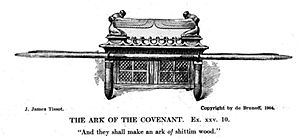Preface
The servant stood poised with the three-pronged hook, watching the boiling water turn the Israelite’s animal sacrifice from blood-red to brownish gray. No longer content with their rightful portion (Deut. 18:1-3), the debauched priests, Hophne and Phinehas, Eli’s sons, wanted all the meat that could be speared from the cooking pot. Not only that, before the fat was burned (1 Samuel 2:16), they demanded raw meat for roasting—going against sacrificial law. Any objections were met with force. Israel was all too familiar with the actions of these sons of Belial who grew fat with the best of all the offerings of Israel while their father looked on (1 Samuel 2:29).
Compounding their offenses, the brothers flaunted their wantonness by openly sleeping with women who assembled at the tabernacle of meeting (1 Samuel 2:22). Eli knew such wicked impudence toward the LORD and His offerings would have serious consequences—for them and for Israel. How could he help but remember when God warned him through Samuel about his vile sons (3:11-14)? Surely the prophecy of the man of God was etched into his memory, and that stinging indictment for honoring his sons more than God Himself.
He pleaded with them. “Why do you do such things? For I hear of your evil dealing from all the people. It is not a good report that I hear. You make the LORD’s people transgress” (1 Samuel 2: 23-24). His words fell on deaf ears, and ultimately, they would all pay with their lives.
***
Trouble for Israel
The battle was intense and bloody, and now Israelite bodies—thousands of them—lay strewn on the battlefield. The Philistines claimed victory, no doubt celebrating long into the night at Aphek.
How could this have happened? When word reached the camp at Ebenezer, the elders could only ask, “Why has the LORD defeated us today before the Philistines?”
It was obvious that the LORD’s blessing was missing. The only thing to do was to send to Shiloh for the ark of the covenant of the LORD of hosts, which they did; and it arrived at the camp along with the reprobates, Hophne and Phinehas.
Heartened by the sight of their cherished ark, the Israelite camp erupted into shouts of celebration. Philistine confidence changed to terror at the thought that suddenly Israel’s God was there—the One who sent horrible plagues against Egypt. Officers quickly rallied their troops, shouting, “Be strong and conduct yourselves like men, you Philistines, that you do not become servants of the Hebrews, as they have been to you. Conduct yourselves like men, and fight!” (1 Samuel 4:9.)
Obedient soldiers rushed into the fray. When it was finally over, the Philistines had prevailed once more. Eli’s sons lay among the casualties. A triumphant army returned to Ashdod bringing with it a treasure beyond belief—Israel’s sacred ark of the covenant.
No good news
Eli, ninety-eight years old, heavy, and nearly blind, sat by the wayside near Shiloh, trembling with apprehension. The ark had left the city—his wicked sons had gone with it. Now he could only wait. Would it return? Were the prophecies already coming to pass?
His failing eyes probably could not make out the survivor who finally straggled into Shiloh with the sorry report, but his ears told the story. Unmistakable cries of distress filled the air, and the messenger himself confirmed Eli’s worst fears: the ark of the covenant—captured by the Philistines, and his two sons, dead. Recoiling in shock, Israel’s judge of forty years toppled backward off his seat and died of a broken neck.
One more casualty
At the same time, Phinehas’ wife went into labor, perhaps precipitated by the dreadful news. The ark had been captured! Her husband and Eli, dead! With one last push, her strength was spent. The midwives tried to revive her with the news of a baby boy, but all she could think about was the ark and her loss. She managed to name her baby Ichabod (which means there is no glory), and with her dying words she said, “The glory has departed from Israel, for the ark of God has been captured” (1 Samuel 4:22).
What we do and do not know
Ichabod’s mother is anonymous. She gets four verses in the Bible. By piecing together other scriptures we know that she was married to a priest who was unfaithful to God and unfaithful to her. She lived during one of the lowest points in the history of the nation of Israel. There is no other record of her in the Bible. While it seems likely Eli had given up on his rebellious sons (even though he shared in their guilt), we have no indication of her thoughts regarding her husband, Phinehas. Was she privy to Samuel’s warning message, or the ominous prophecy of the man of God regarding her family’s future? The Bible gives no indication.
What we do have is evidence of her dying concern for the fate of Israel and for the ark of God. If only we could know more.
(For the complete account, please read 1 Samuel 1-4.)

